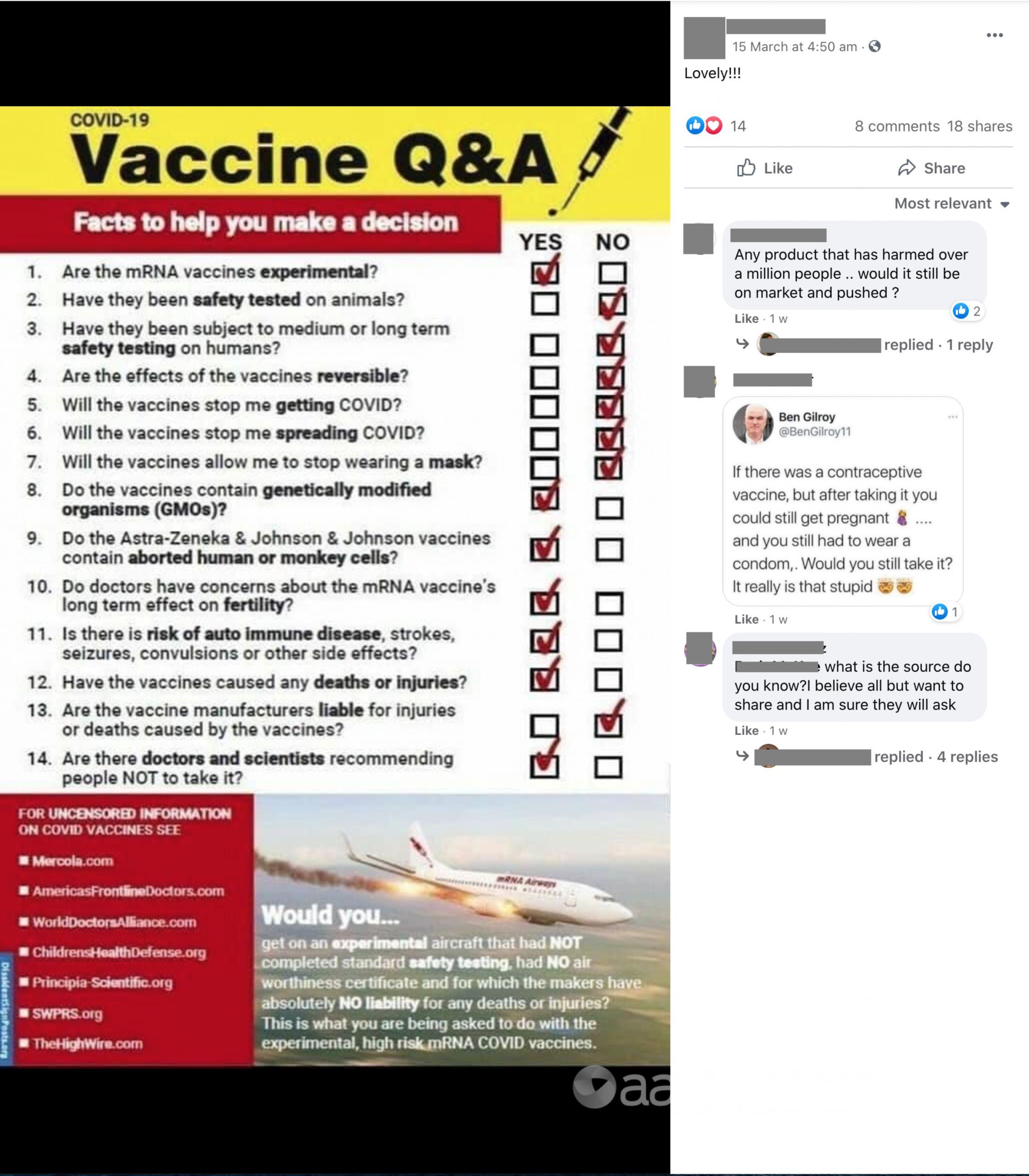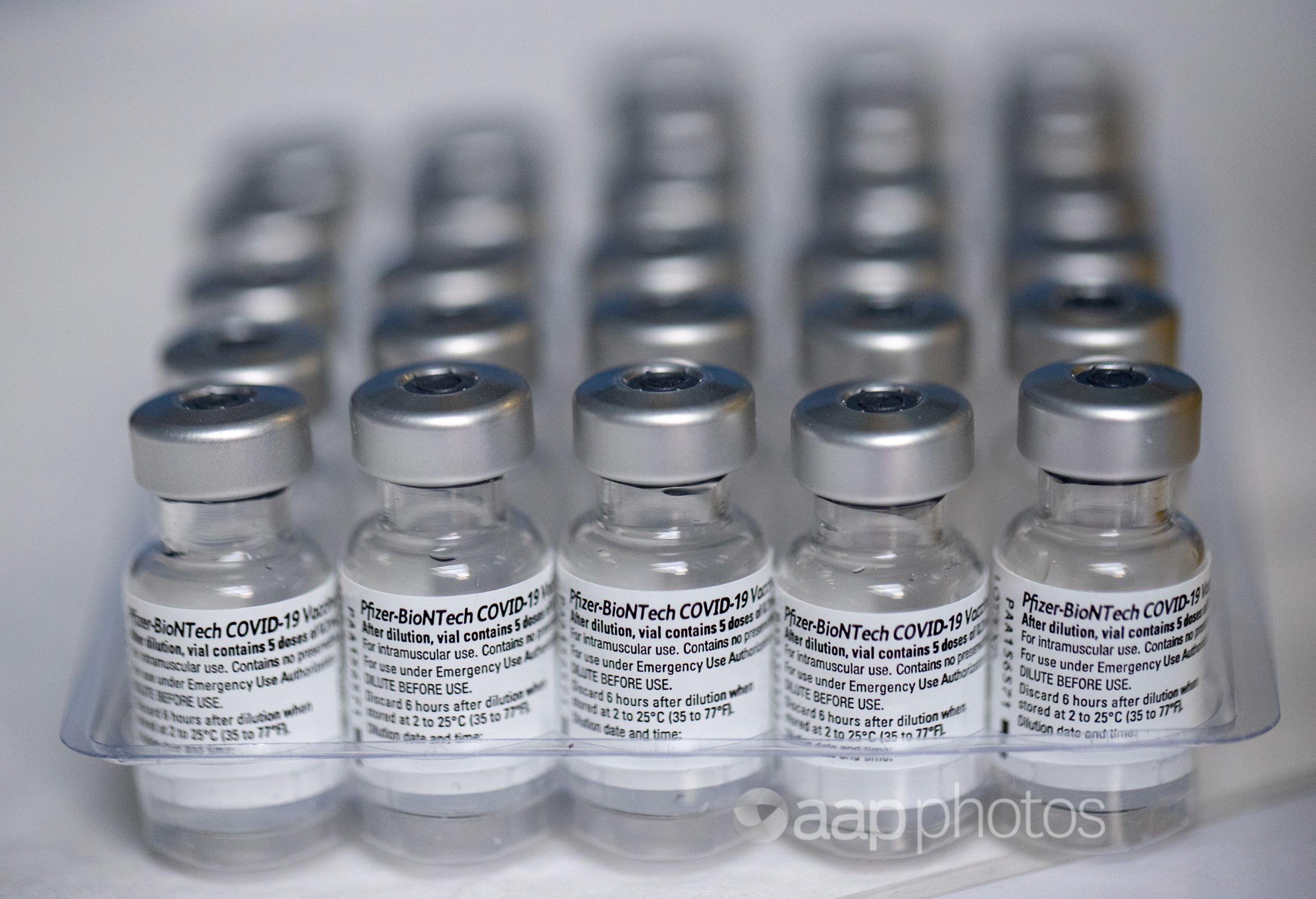The Statement
A widely shared meme features a “COVID-19 Vaccine Q&A” that includes a series of claims, including that the inoculations skipped crucial testing stages, contain cells from foreign sources and cause serious harm to human health.
The meme, included in a March 15 Facebook post, shows a checklist of 12 questions with either a “yes” or “no” box ticked for each under a banner which reads, “Facts to help you make a decision”.
Among the claims are that COVID-19 vaccines have not been “safety tested on animals”, the “Astra-Zeneka (sic) and Johnson & Johnson vaccines contain aborted human or monkey cells”, “doctors have concerns about the mRNA vaccines’ long term effect on fertility”, “the vaccines increased the risk of auto immune diseases” and that the vaccines have “caused deaths or injuries”.
The meme has been shared by several Australian users and across a range of platforms, including Facebook, Twitter, Telegram, Reddit and Instagram.

The Analysis
While some of the checklist’s entries are based in fact, it also contains significant misinformation – wrongly claiming, for example, that COVID-19 vaccines did not undergo animal trials and that they contain monkey or aborted human cells.
In the US, the Food and Drug Administration has authorised the Pfizer/BioNTech, Moderna and Johnson & Johnson Janssen COVID-19 vaccines for emergency use, while the European Medicines Agency has also authorised use of AstraZeneca’s vaccine. In Australia, the Therapeutic Goods Administration (TGA) has provisionally approved the Pfizer and AstraZeneca vaccines for use.
As stated in the meme, AstraZeneca’s vaccine does contain genetically modified organisms (GMOs), while mRNA-based vaccines – such as those from Pfizer and Moderna – have been described as “experimental” in trials, although researchers have been studying the technology for decades.
In addition, AAP FactCheck investigated a number of the posts’s questionable claims:
Have the vaccines been safety tested on animals?
The meme states the COVID-19 vaccines have not been safety tested on animals, however this is false. Vaccines go through multiple stages of trials to assess their safety and efficacy, and each of the four aforementioned companies tested their candidates on animals before they were approved for human use.
The Pfizer mRNA vaccine was tested on mice and rhesus macaque monkeys, Moderna’s vaccine was also tested on rhesus macaques, the AstraZeneca vaccine undertook preclinical trials in rhesus macaques and mice and Janssen’s candidate was tested on macaque monkeys and golden hamsters.
All the animal trials found the vaccine candidates demonstrated protection against the SARS-CoV-2 virus.
Do the AstraZeneca and Johnson & Johnson vaccines contain monkey or aborted human cells?
As previously explained by AAP FactCheck, laboratory-made cell lines derived from a single aborted fetus in the 1970s were used during the development of AstraZeneca’s COVID-19 vaccine. However, the final vaccine formulation does not contain cells of any kind.
The Janssen vaccine also uses laboratory-made cells descended from a fetus that was electively aborted in 1985, however, the vaccine then goes through several purification steps. A Janssen ANZ spokeswoman told AAP FactCheck in an email there is “no fetal tissue of either animal or human origin in the vaccine”.
Both the Pfizer and Moderna mRNA-based vaccines use fetal cell lines for confirmation tests to ensure the inoculations function correctly, however neither use these cells for manufacturing nor do the inoculations contain fetal cells.
Regarding monkey cells, the University of Oxford says AstraZeneca’s vaccine uses a weakened common cold virus which usually infects chimpanzees as its vector. A spokeswoman for AstraZeneca told AAP FactCheck via email the vaccine uses “virus cells which can’t replicate in humans”, but there is “nothing from another species” in the formulation.
Do doctors have concerns about mRNA vaccines’ long-term effect on fertility?
AAP FactCheck has previously debunked claims that mRNA vaccines could lead to recipients becoming infertile. The claim was advanced by a former Pfizer employee and a German physician who said the vaccine would induce antibodies against proteins such as syncytin-1, which is involved in the development of the placenta in humans.
However, an article published in the British Medical Journal in February detailed advice from the Association of Reproductive and Clinical Scientists and the British Fertility Society which “refutes any link between the vaccines and fertility”.
A spokeswoman for Pfizer told AAP FactCheck in an email “there is no data to suggest that the Pfizer-BioNTech COVID-19 vaccine causes infertility” and pointed to advice from the Australian government’s Department of Health, a TGA Assessment Report (page 15) and the CDC.
Pregnancies were reported by participants who received the vaccine during both the Pfizer (page 41) and Moderna (page 45) clinical trials.
Is there a risk of autoimmune disease, strokes, seizures, convulsions or other side effects?
There is no data available on the safety of COVID-19 vaccines for people already experiencing autoimmune conditions such as arthritis and multiple sclerosis, as highlighted by the CDC.
Nevertheless, as explained by health authorities, such as the Department of Health, there is no evidence to suggest the vaccines can cause these conditions.
University of Western Australia associate professor Archa Fox, an expert in RNA biology, wrote in The Conversation that it wasn’t clear where the myth linking autoimmune diseases to mRNA vaccines came from. But the short-lived nature of mRNA made an autoimmune trigger from these vaccines “highly unlikely”, she said.
A TGA spokesperson told AAP FactCheck in an email that autoimmune diseases, stroke, seizures and convulsions are “not recognised adverse effects of either of the COVID-19 vaccines approved for use in Australia”.
However, authorities have highlighted evidence that the AstraZeneca vaccine may cause rare but serious cases of blood clotting in the brain, leading countries such as Australia and the UK to limit its use among younger recipients. The exact relationship between the vaccine and condition was not known as of April 8.
Have the vaccines caused deaths or injuries?
National and international drug regulators have found no conclusive evidence of any deaths caused by COVID-19 vaccines. These include the CDC, European Medicines Agency, UK government and TGA.
Meanwhile, a WHO update on March 11 stated “no cases of deaths have been found to have been caused by COVID-19 vaccines” as of March 9, 2021 after more than 268 million doses of the vaccines were administered.
A TGA spokesperson told AAP FactCheck in a March 25 statement: “None of the deaths reported to us to date are thought to be caused by vaccination.
“Many people vaccinated so far in Australia have been older, with pre-existing medical conditions. Older age and underlying illnesses make it more likely that coincidental adverse events, including deaths, will occur.”
Nevertheless, European regulators have indicated a small number of deaths among AstraZeneca vaccine recipients due to blood clots may be linked to the vaccine (see here and here), although the casual connection remains unproven.
The Verdict
While the post contains some true statements, such as about the presence of GMOs in some vaccines, it also contains several falsehoods.
It wrongly claims that COVID-19 vaccines haven’t been safety tested on animals; the Moderna, Pfizer, Janssen and AstraZeneca vaccines all completed animal trials. Similarly, no fetal or animal cells are present in any of the vaccines, contrary to the post’s suggestion.
Experts and authorities also say there is no evidence to support claims that vaccines negatively affect fertility or increase the risk of autoimmune diseases, while there is also no conclusive proof any of the immunisations have led to deaths.
Partly False – Content that has some factual inaccuracies.
Updated Friday, April 9, 2021 16:06 AEDT: Analysis updated to include new information about potential links between the AstraZeneca vaccine and rare cases of blood clotting.
* AAP FactCheck is an accredited member of the International Fact-Checking Network. To keep up with our latest fact checks, follow us on Facebook and Twitter.
All information, text and images included on the AAP Websites is for personal use only and may not be re-written, copied, re-sold or re-distributed, framed, linked, shared onto social media or otherwise used whether for compensation of any kind or not, unless you have the prior written permission of AAP. For more information, please refer to our standard terms and conditions.


















